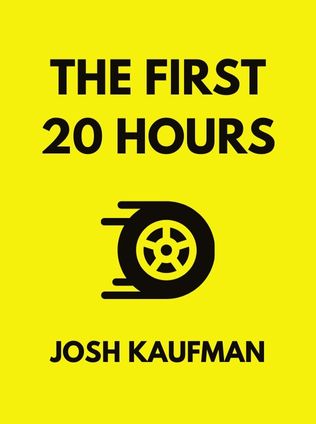
The First 20 Hours
How to Learn Anything...Fast
By Josh Kaufman
Published 01/2013
About the Author
Josh Kaufman is an acclaimed author and expert in business, entrepreneurship, and skill acquisition. His work focuses on providing practical insights and tools that enable individuals to achieve success across various domains. Kaufman’s first book, "The Personal MBA," became an international bestseller and is highly regarded for its accessible approach to business education. Following its success, Kaufman wrote "How to Fight a Hydra," a guide on overcoming fear and taking on big challenges. In "The First 20 Hours," Kaufman shifts his focus to the process of learning new skills, distilling his own experiences and extensive research into a method that helps anyone acquire new abilities quickly and efficiently. His writing is grounded in real-world applications and scientific principles, making complex concepts easy to understand and apply.
Main Idea
"The First 20 Hours" is based on the premise that learning a new skill does not require years of dedication or thousands of hours of practice. Instead, Kaufman argues that with just 20 hours of focused, deliberate practice, anyone can achieve a basic level of proficiency in almost any skill. The book provides a detailed, step-by-step process for rapid skill acquisition, emphasizing the importance of preparation, smart practice techniques, and overcoming common barriers. Kaufman’s approach is designed to make the learning process accessible and enjoyable, helping readers gain new skills quickly and confidently, without the overwhelm often associated with learning something new.
Table of Contents
- Deconstructing Skill Acquisition
- The Science Behind Rapid Learning
- Overcoming Common Barriers
- The First 20 Hours: A Step-by-Step Guide
- Case Studies and Real-Life Applications
Deconstructing Skill Acquisition
Kaufman begins by challenging the widespread belief that learning a new skill requires a significant investment of time and effort. He addresses the popular "10,000-hour rule," which suggests that becoming an expert in any field requires at least 10,000 hours of deliberate practice. While this rule may hold true for achieving world-class expertise, Kaufman points out that most people do not need to reach such levels of mastery to benefit from a new skill. Instead, his focus is on achieving a functional level of proficiency, which can often be reached in just 20 hours of focused practice.
The Difference Between Learning and Mastery
Kaufman makes a clear distinction between learning a skill and mastering it. Mastery is a long-term goal that requires extensive practice and dedication, but most people are not seeking mastery—they are seeking competence. According to Kaufman, reaching a basic level of competence in a skill can be much quicker and easier than people think, as the initial stages of learning often involve rapid progress. These early gains can be enough to allow individuals to perform the skill effectively, even if they are not yet experts.
"Mastery is not the goal for most learners; the goal is proficiency." - Josh Kaufman
To illustrate this point, Kaufman refers to the 80/20 rule, also known as the Pareto Principle. This rule suggests that 80% of the results come from 20% of the efforts. By focusing on the most critical aspects of a skill—the "20%"—you can achieve the majority of your desired outcomes with relatively little practice. This approach allows learners to bypass the daunting prospect of long-term commitment and instead focus on achieving quick, meaningful progress.
The Science Behind Rapid Learning
Kaufman grounds his method in neuroscience, which shows that the brain is highly adaptable and capable of forming new neural connections through practice. When you engage in focused practice, your brain reorganizes itself to improve efficiency and performance in the skill you are learning. This process, known as neuroplasticity, enables you to make significant progress in a short period.
The Three Stages of Learning
Kaufman outlines three stages that learners go through when acquiring a new skill: cognitive, associative, and autonomous. In the cognitive stage, you are actively thinking about what you are doing and trying to understand the basics. In the associative stage, you start to recognize patterns and make adjustments, but you still need to concentrate on your actions. Finally, in the autonomous stage, the skill becomes second nature, and you can perform it with little conscious effort.
"Your brain is designed to learn and grow through practice." - Josh Kaufman
These stages are supported by changes in the brain's structure as you practice. Neurons form new connections, and myelin, a substance that insulates nerve fibers, thickens around these connections, making them more efficient. This neurological process underlies the rapid improvements seen in the early stages of skill acquisition.
The Power of Focused Practice
Kaufman emphasizes the importance of focused practice, which involves dedicating concentrated periods of time to learning a skill without distractions. This type of practice is more effective than spreading practice out over long periods because it allows your brain to build and strengthen the necessary neural connections more efficiently. The more focused your practice, the faster you will progress through the stages of learning and reach a basic level of competence.
Sign up for FREE and get access to 1,400+ books summaries.
You May Also Like
The Subtle Art of Not Giving a F*ck
A Counterintuitive Approach to Living a Good Life
By Mark MansonRich Dad Poor Dad
What the Rich Teach Their Kids About Money - That the Poor and Middle Class Do Not!
By Robert T. KiyosakiHow To Win Friends and Influence People
The All-Time Classic Manual Of People Skills
By Dale CarnegieFreakonomics
A Rogue Economist Explores the Hidden Side of Everything
By Steven D. Levitt and Stephen J. Dubner



















